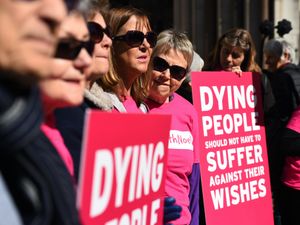Pandemic ‘has exposed everything that is wrong in our relationship with dying’
Campaigners are calling for a frank review of assisted dying laws as the country emerges from the Covid-19 pandemic.

The coronavirus pandemic has exposed “everything that is wrong with our relationship with dying” and assisted dying laws must be re-examined as the country begins to recover, campaigners say.
Terminally ill people should be able to choose how their lives end through a law change with safeguards to prevent abuse, a book written by members of the campaigning organisation Dignity in Dying argues.
The book, Last Rights: The Case For Assisted Dying, has won support from celebrities including actor Sir Patrick Stewart, chef and TV presenter Prue Leith, and author Ian McEwan.
The authors say society must make sense of the Covid-19 crisis by using it as a platform for change and taking a “frank, honest look” at the laws around assisted dying in England.
Sarah Wootton, Dignity in Dying chief executive and co-author Lloyd Riley write: “This unfamiliar territory that we now find ourselves in has exposed everything that is wrong with our relationship with dying.
“Clinicians have inherited a near-monopoly on decision-making at the end of life, a status quo that assumes they will decide for people rather than with them.
“There is limited space for people to speak openly about how they want to die, and this has left a vacuum in which a moral and ethical fudge around end-of-life treatment and choice has manifested itself.”
They add: “There has never been a better time for ambitious reform of dying in this country.”
The law being proposed would only apply to mentally competent, terminally ill adults in the final months of their lives.
Two doctors would assess each person and their request would then be examined by a High Court judge before life-ending medication is prescribed and taken under medical supervision.
It follows a model in Oregon, US, where assisted dying has been legal for 23 years and no cases of abuse have been recorded.
Jane Parker, who lives with her husband Adrian in Devon, was diagnosed with motor neurone disease in October and is now unable to speak, while swallowing is difficult.
The 68-year-old retired physiotherapist said: “The coronavirus pandemic has given everyone a small insight into what it is like to live with a terminal illness – the lack of choice, fear over what is to come, feeling trapped in a situation you have no control over. But for people like me this will continue, pandemic or not.”
The grandmother of five continued: “I do not want to suffer a protracted, traumatic death but my options are severely limited, even more so since lockdown.
“Travelling to Switzerland for a legal assisted death, for example, is made even more difficult under current restrictions. I want to die at home, and am genuinely considering the idea of refusing food and water – a legal option under the current law.
“How can we allow people to starve and dehydrate to death, but not allow someone to slip away, quickly and peacefully in their sleep?”
Ms Wootton said the coronavirus pandemic has made people feel “powerlessness, fear, and anxiety over an uncertain future”.
She said: “We have been shocked at how some have died from Covid-19: frightened; isolated; feeling like doctors are making decisions for them, not with them.
“But this is precisely what terminally ill people already face under the UK’s ban on assisted dying.
“They are denied choice and control at a time they need it most and are instead forced to resort to drastic measures which often leave them dying in secret, alone, terrified and in pain.”
A Ministry of Justice spokeswoman said: “Any change in the law affecting such terribly sad cases must be for MPs to consider as a matter of individual conscience, rather than a decision for Government.”





